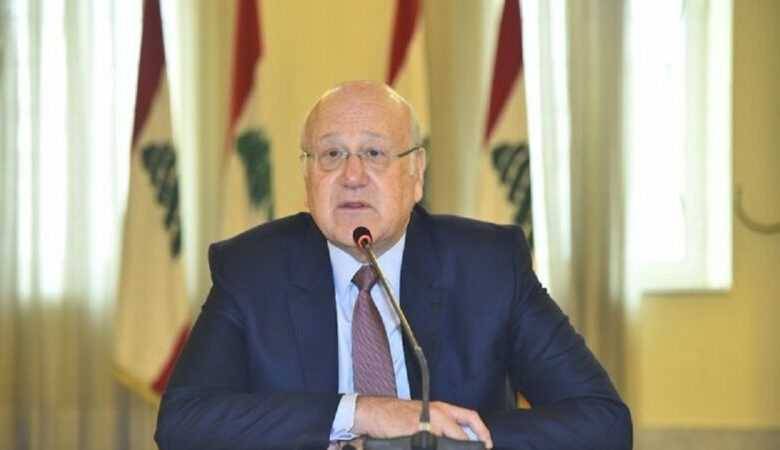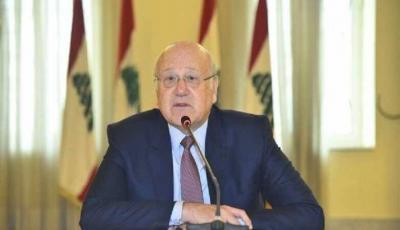Lebanese President Michel Aoun is hesitating to set a final date for holding the mandatory parliamentary consultations to name the president tasked with forming the new government, waiting for the head of the "Free Patriotic Movement," MP Gibran Bassil, to finalize the list of candidates. Prominent sources from both the ruling and opposition factions say this is an attempt to pressure caretaker Prime Minister Najib Mikati, as he is undoubtedly the frontrunner to assume the presidency of the new government. Aoun is aware that delaying the government’s formation will increase the political, economic, and financial costs on a country that can no longer afford to waste opportunities, potentially leading to heightened popular protests.
The same sources express skepticism about whether the mandatory parliamentary consultations will take place this week unless Aoun succumbs to requests from parliamentary blocs and independent MPs to expedite the process. They question the purpose of delaying it, noting that the Lebanese constitution does not impose a timeline for completing these consultations, nor does it require the designated prime minister to adhere to a similar timeframe for forming the government.
These sources warn that the president's hesitation in inviting MPs to the mandatory consultations could lead to a repeat of the scenario he followed before inviting them after the resignation of Prime Minister Hassan Diab's government, which resulted in the naming of "Future Movement" leader Saad Hariri to form the government. Hariri later had to step back from this role after being confronted with Bassil's demands, which Aoun wholly endorsed, refusing to intervene to regulate his son-in-law's conditions for facilitating its formation.
The sources disclose to "Asharq Al-Awsat" that Bassil is soliciting offers by directly communicating with several candidates for the premiership in a bid to rearrange the political dynamics. They assert that the political kitchen at the presidential palace, which is loyal to Bassil, is instigating the candidates, organizing meetings, and urging them to engage with various leaders to inform them of their reform programs if they assume the premiership.
They emphasize that these meetings have not yielded any concrete outcomes but merely serve to familiarize these leaders with the candidates, most of whom were hastily brought in by Bassil. Notably, former International Monetary Fund expert Saleh Nasloui has joined the ranks of candidates, reportedly at the behest of Aoun-Bassil's team, which was behind encouraging him to offer his services for the third presidency.
The same sources believe that although Bassil realizes that it would be difficult to circumvent Mikati—who is the internationally favored candidate for the premiership—he is attempting to pressure him in hopes of improving his conditions in the next government. This sentiment is echoed by some MPs within his parliamentary bloc, who voiced their concerns during the first session dedicated to reconstituting the legislative body, stating that Bassil publicly opposes Mikati's return to the presidency to send a political message that suggests necessary communication with him to mend ties with the caretaker PM.
They point out that the political team aligned with Aoun-Bassil is overseeing efforts to counter most candidates in a bid to corner and unsettle Mikati. However, Mikati remains calm and dismisses those claiming to possess the credentials and conditions necessary for a non-existent competition, as most parliamentary blocs regard Bassil's maneuvers as coming during a time that cannot be built upon as a viable option with majority support in parliament.
The sources contend that the responsibility now lies with the president, and the justification his political team employs in defending Aoun's hesitation to invite MPs for the mandatory consultations will hold no political weight, particularly since he is not in a political position to eliminate the obstacles hindering government formation before the consultations to name the designated prime minister are held.
Aoun's delay in inviting MPs for the mandatory consultations is categorized as a response to his political heir, Bassil, who is complicating matters unless the new government is formed to his specifications. They assert that merely extending this period of hesitation will result in a political campaign extending beyond domestic affairs, pushing towards international conditions that require adherence to its reform contents to ensure Lebanon's transition to recovery, ahead of what the mandatory parliamentary consultations might bring.
Mikati confirmed to "Asharq Al-Awsat" that he will not evade responsibility, stating that he has national rather than personal conditions for rescuing the nation, primarily the endorsement of reforms and a financial recovery plan, along with revitalizing the electricity sector. He indicated that failure to do so would give opportunities to numerous contenders for the premiership.
Although Mikati avoids delving into the specifics of discussions held between him and Aoun in their last meeting, he firmly states that he will not assume the presidency of a government managing and prolonging a crisis in a country on the brink of total collapse, necessitating collective efforts to rescue it rather than engaging in futile disputes that hamper efforts to resolve the unprecedented crisis.
The lingering question remains: Will Aoun decisively shorten the timeframe he has allocated for holding the mandatory parliamentary consultations? Because any attempt to play for time, regardless of the excuses, will ultimately obstruct efforts aimed at averting a comprehensive social explosion that cannot be healed through media statements or mutual accusations. Thus, Aoun's hope to subject Mikati to Bassil's conditions is misplaced and will backfire catastrophically on anyone hindering the formation of the government, regardless of the reasons presented.
Therefore, will Aoun be responsible for inundating the country in a game of gathering opinions to find a candidate for the premiership? Or will he streamline the process of forming it after Mikati has stated unequivocally that he will not form a government that is not ultimately aimed at reconciling with the Lebanese people and addressing their suffering in pursuit of basic needs and a commitment to extricating the country from political and electrical darkness? Otherwise, the crisis remains wide open.




